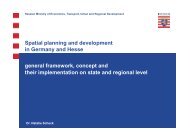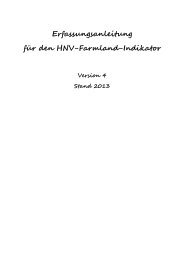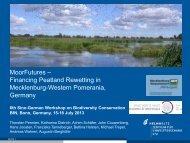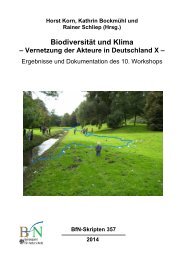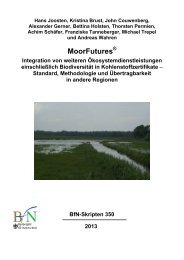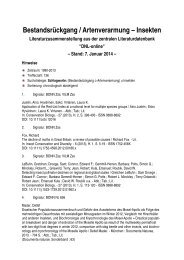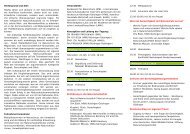Caring for Pollinators - Bundesamt für Naturschutz
Caring for Pollinators - Bundesamt für Naturschutz
Caring for Pollinators - Bundesamt für Naturschutz
Create successful ePaper yourself
Turn your PDF publications into a flip-book with our unique Google optimized e-Paper software.
Ssymank Highlights - Zusammenfassung<br />
5. Highlights<br />
by Axel Ssymank<br />
1. Objectives<br />
<strong>Pollinators</strong> provide an essential ecosystem service ensuring crop production and food security<br />
world wide as well as maintaining the biodiversity of plants. A decline in pollinators is<br />
thus a serious threat to biodiversity as a whole. With COP V/5 decision in 2000, an International<br />
<strong>Pollinators</strong> Initiative (IPI) was established under the coordination of FAO - and in 2002,<br />
with COP Decision VI/5, an action plan was endorsed. Since that time, a number of regional<br />
pollinators initiatives has been established, and become operational.<br />
At COP 9, a side-event was held on “<strong>Caring</strong> <strong>for</strong> pollinators”. The main objectives of the sideevent<br />
were to: (i) support the various pollinator initiatives, by raising awareness on the importance<br />
of pollinators and possible consequences of their decline (FAO report 2008); (ii)<br />
broaden the work in order to investigate all main pollinator groups; (iii) identify the actual<br />
state of action being taken to conserve and manage pollinators and actions needed in future.<br />
The side-event was organized by the Federal Agency <strong>for</strong> Nature Conservation (BfN), Bonn<br />
in cooperation with the University of Bonn (Prof. Wittmann). It consisted of two components:<br />
a workshop and a pollinator’s buffet. The workshop started with oral presentations to illustrate<br />
and introduce the key ecosystem service of pollinators with bees and flies as main pollinator<br />
groups and presented the tasks of the International <strong>Pollinators</strong> Initiative and the practical<br />
example of a regional initiative with the successful Brazilian <strong>Pollinators</strong> Initiative. A series<br />
of posters with the work of the other regional pollinator initiatives complemented the<br />
presentations.<br />
The pollinator’s buffet was a fruit buffet to demonstrate that fruits worldwide are dependent<br />
on pollination: fruit diversity and our food is directly linked to pollinator diversity and offered<br />
the occasion to discuss different issues of pollination with delegates at COP9.<br />
2. Presentations and posters<br />
The following oral presentations were given:<br />
2.1. “The Brazilian <strong>Pollinators</strong> Initiative: Update of recent progress“ by Braulio Dias, Ministry<br />
of Environment, Brazil<br />
Braulio Dias introduced the Brazilian <strong>Pollinators</strong> Initiative (BPI), being one of the most active<br />
regional pollinator initiatives. The BPI was established in 2000, and has initiated a number of<br />
activities, in addition to participating in the development of the FAO coordinated project<br />
“Conservation and Management of pollinators <strong>for</strong> Sustainable Agriculture, Through an Ecosystem<br />
Approach”. Amongst the activities initiated, the Probio (Brazilian Biological Diversity<br />
Conservation and Sustainable Use Project) Project issued two public calls to support projects<br />
on pollinators management were launched in 2003 and 2004. Nineteen subprojects<br />
have developed management plans <strong>for</strong> pollinators of nineteen different crop species and<br />
107





